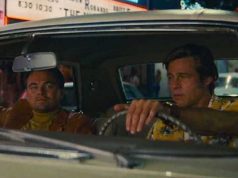The idea behind “CSA: The Confederate States of America” is such a good one that I wish a more talented filmmaker than Kevin Willmott, and one with better resources, had come up with it.
Imagine we live in an alternate reality where the South won the Civil War. Now imagine you’re watching a local TV station one evening as it airs a British-made documentary about American history. “CSA: The Confederate States of America” is that documentary, complete with commercials that reflect the culture of modern Confederate America.
With a satiric eye, Willmott uses “historians” and faked news footage to show the last 143 years of American history. We see Lincoln’s exile to Canada, an early D.W. Griffith silent film depicting his capture, and clips from the 1955 thriller “I Married an Abolitionist” (abolitionists where the big boogeymen in the ’50s, rather than Communists). A commercial advertises daily reruns of “Leave It to Beulah,” about a sassy slave in a white household. Before the documentary begins, viewers are warned that, due to its controversial nature (it was made by anti-slavery Brits, after all), it may not be suitable “for children or servants.”
Willmott’s imagination about how history would have changed with a Southern victory is perceptive and sharp. The Confederacy actually did have plans to colonize Latin America, so Willmott uses that. The anti-Negro philosophies of the day, made law by the new Confederate States of America, evolve into anti-everything, putting the C.S.A. right in line with Hitler when he comes along.
Some of the faked stock footage and newsreels are remarkably well done, notably the aforementioned D.W. Griffith short, which is also raucously funny. But others are obviously low-budget and shoddily made, and few of the actors are convincing. One of the keys to success here is making this faux documentary and its accompanying TV commercials look legit, and much of the material just doesn’t cut it.
Another problem is the project itself: I think Willmott bit off more than he could chew. Retooling all of post-bellum American history is a huge project, and telling it in its entirety means making a film that feels too long. The jokes and satire would need to be more incisive than they are in order for the idea to sustain itself for 91 minutes.
This is dangerous territory. When we see a commercial for an outrageously racist restaurant, accompanied by undignified portrayals of happy slaves with their “yes, massa” dialect, do we laugh? And if we do, are we laughing at how absurd racism is, or are we laughing because happy slaves with their “yes, massa” dialect are funny? Are we laughing AT the blacks, or WITH them? There is much potential for misunderstanding here, and Willmott’s work, while notable in some regards, doesn’t measure up.
C+ (1 hr., 31 min.; )





